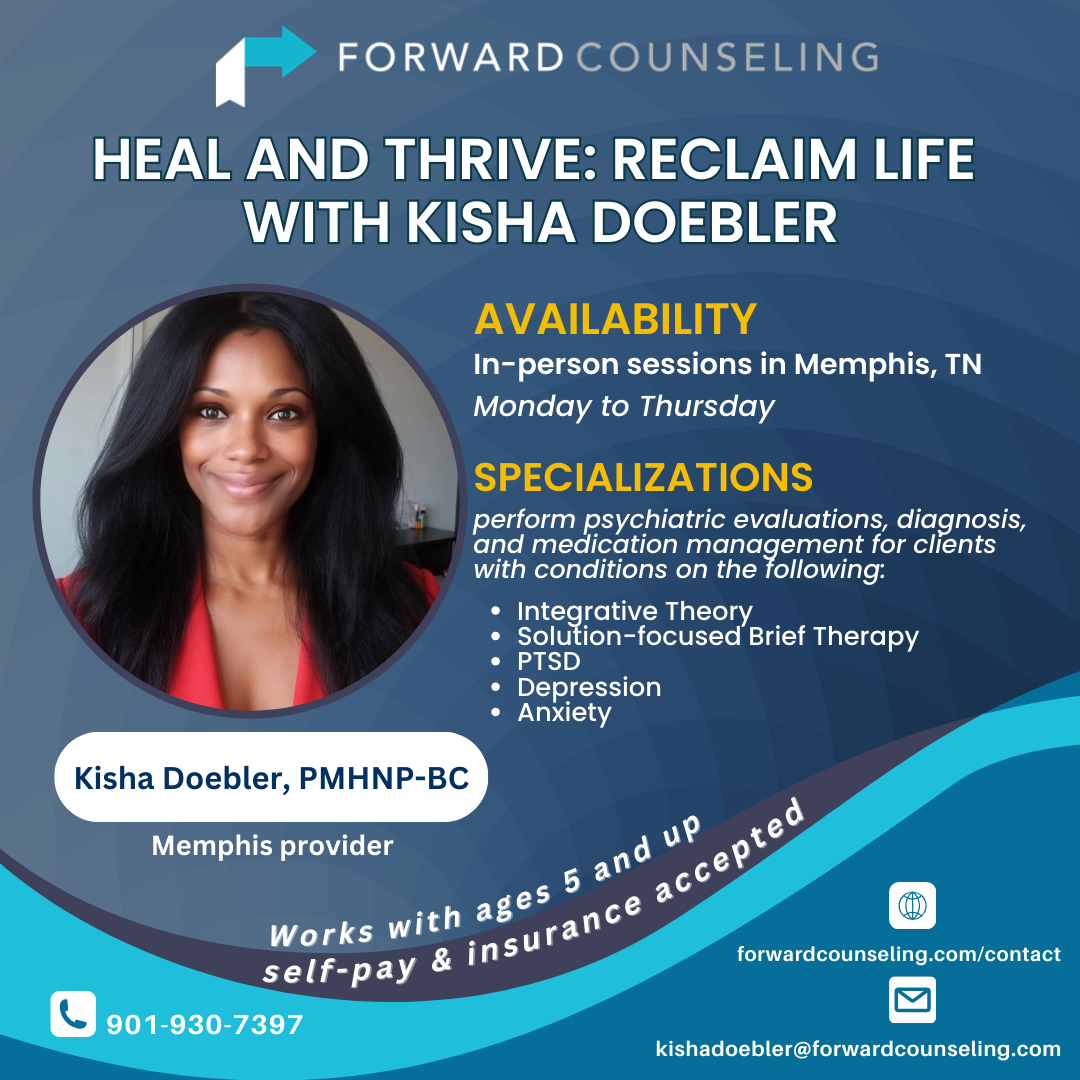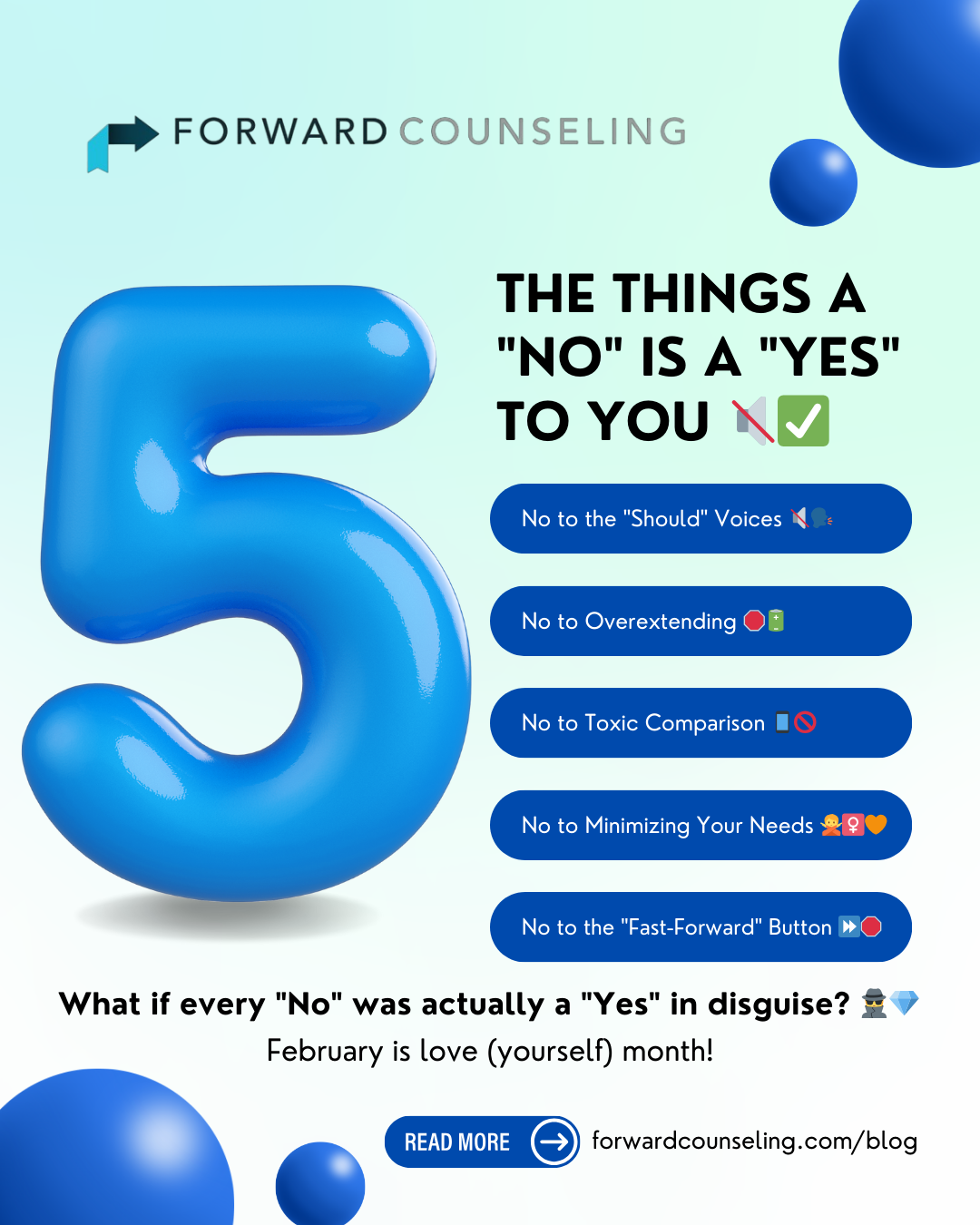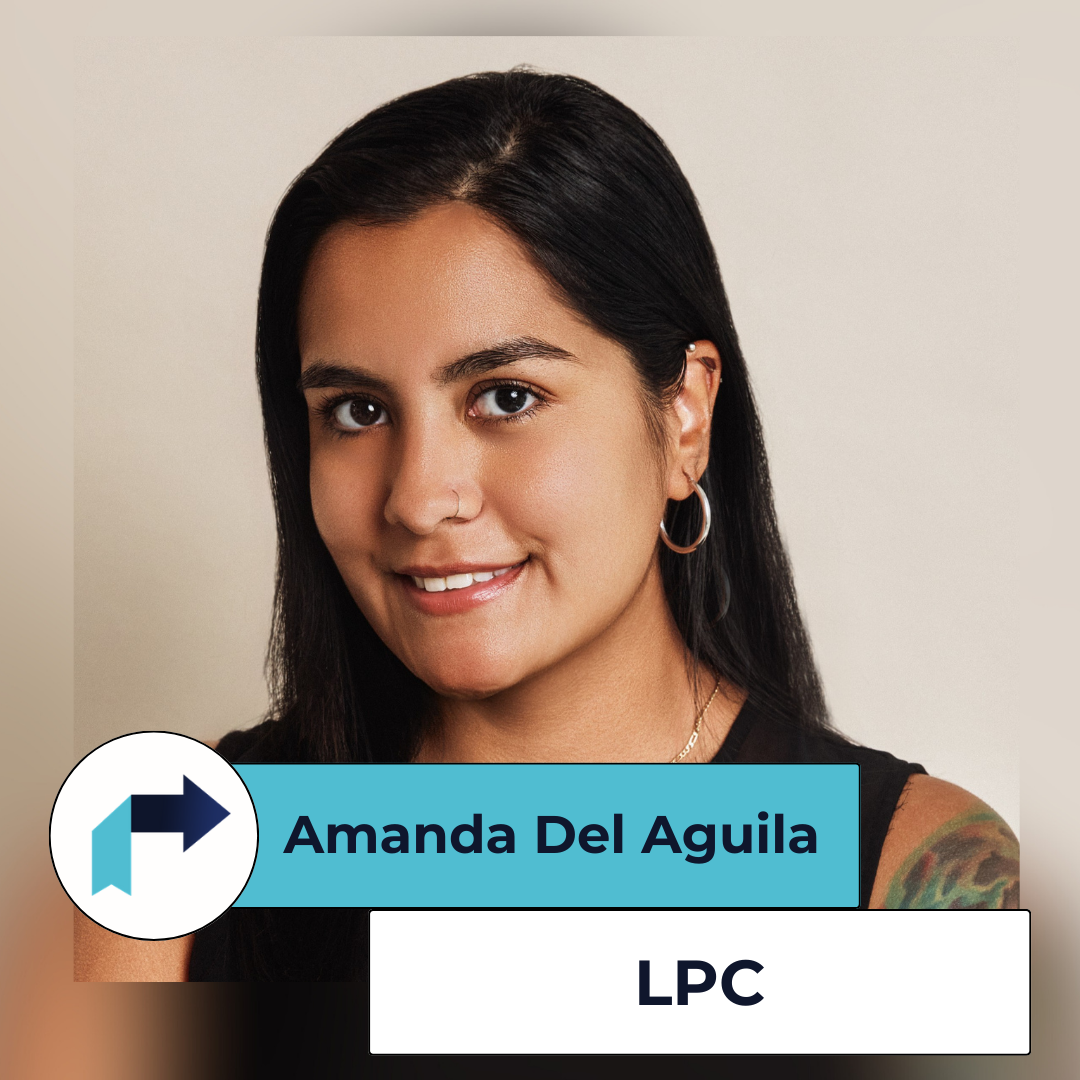Compassionate Care for a Healthier Mind: Meet Kisha Doebler at Forward Counseling of the Mid-South
/Meet Forward Counseling’s new provider, Kisha Doebler, PMHNP-BC, a compassionate and dedicated Nurse Practitioner committed to providing holistic and patient-centered care. With a profound understanding of the intricate connection between physical and mental well-being, Kisha offers support for a wide range of concerns, striving to empower individuals on their unique journeys toward improved mental health.
Join our Q&A session with the newest provider at Forward Counseling and discover how Kisha Doebler can help you on your healing journey.
1. Why should someone meet with a medical/psych provider?
If you notice any new or concerning physical symptoms such as pain, fatigue, changes in weight, or digestive issues, it is a good idea to consult a medical provider. A medical provider can assist in uncovering the underlying cause. If you are experiencing intense or overwhelming emotions such as anger, sadness, or anxiety that impact your daily life, it may be beneficial to connect with a mental health provider. Medical and mental health often connect, and sometimes, ongoing physical symptoms like headaches, stomach problems, or chronic pain relate to underlying mental health conditions.
2. What sparked your passion for supporting the mental well-being of others?
What sparked my passion for supporting the mental well-being of others is deeply rooted in my own experiences and observations. As someone with autism, I've navigated the world in a way that sometimes presents unique challenges to mental and emotional health. This personal journey has given me a profound empathy for the struggles others might face, even if those struggles look different on the surface. Witnessing the impact of stigma surrounding mental health and understanding how it can prevent individuals from seeking the support they need has fueled a strong desire within me to help break down those barriers. I believe that everyone deserves to feel understood, supported, and empowered to prioritize their mental well-being without shame or judgment. My motivation isn't just about alleviating suffering in the moment; it's about contributing positively to humanity by fostering a society where mental health is valued and openly discussed. Knowing that my efforts can contribute to someone feeling better, accessing the right resources, and ultimately leading a more fulfilling life is incredibly meaningful to me. It's about creating a ripple effect of understanding and support, one conversation, one act of advocacy, at a time.
3. What are you most looking forward to connecting with clients here?
What I'm most looking forward to at Forward Counseling of the Mid-South is the opportunity to connect with clients on a genuine and supportive level. I'm eager to understand their individual experiences, challenges, and goals within the specific context of the Mid-South community. From a professional standpoint, I'm excited to contribute to an environment that prioritizes accessible and effective mental health support. I believe in the power of a collaborative therapeutic relationship, and I'm looking forward to building trust with individuals seeking guidance. On a more personal level, I'm driven by the desire to see people thrive. Knowing that I can play a role in helping clients navigate their difficulties, develop coping skills, and ultimately move towards a more fulfilling life is what motivates me. I'm keen to learn from each client's unique journey and contribute positively to their well-being right here in the Mid-South.
4. How should a new client prepare for the first session?
Preparing for your first medication therapy session is a thoughtful step. It's helpful to spend a little time reflecting on what has brought you to seek support right now. What are the primary feelings or challenges you're experiencing that you're hoping the medication can address? You don't need a precise diagnosis, just a general sense of what you're going through. Similarly, thinking about your goals for medication therapy can be beneficial. What kind of changes are you hoping to see? This could be anything from lessening anxiety, alleviating feelings of depression, stabilizing your mood, or generally experiencing an improvement in your overall well-being. These initial thoughts will give us a good starting point for our conversation. It can also be useful to jot down any significant events or experiences that feel relevant to your current situation, as well as a brief note of your current symptoms or how you've been feeling. If you have any specific questions for me about my approach to medication, my experience, or what the overall process of medication therapy looks like, please feel free to write those down as well, so don't forget. On the practical side, please ensure you've confirmed your appointment details – the date, time, and the location here in Memphis. If there was any paperwork sent to you, please try to have that completed beforehand. Knowing how to get to our office and where to park will also make things smoother on the day of your appointment. And if you plan to use insurance, please remember to bring your insurance information with you. Please know that the first session is often about us getting to know each other and for you to share what's been happening. It's perfectly normal to feel a bit nervous or unsure, so please don't put any pressure on yourself. My aim is to create a supportive and non-judgmental space for you. Finally, taking a little extra care of yourself before our appointment – getting some rest, having a meal, and avoiding rushing – can help you feel more grounded and present for our initial meeting.
5. You have a special interest in working with a wide age range of people—what makes that connection so meaningful to you?
Working with individuals across different stages allows me to understand the unique challenges and perspectives that shape their experiences. Each age group brings a different set of needs, aspirations, and insights, and I find it incredibly rewarding to adapt my approach to support their personal growth and well-being. Whether it’s guiding young individuals as they navigate early developmental milestones, assisting adults through life transitions, or helping older adults maintain their quality of life, every interaction reinforces the importance of tailored, compassionate care. The ability to build meaningful connections with people at various points in their journey is what drives my passion for this work.
6. For someone going through a tough time with anxiety, depression, or the effects of trauma, how do you typically begin to offer support, especially this mental health month?
Supporting someone through anxiety, depression, or the effects of trauma requires a compassionate and intentional approach, especially during Mental Health Month when awareness is heightened. I would begin by creating a safe space for open communication, encouraging them to share their feelings without judgment or pressure. Listening actively, validating their emotions, and acknowledging their struggles are essential in building trust. I would also help them identify coping strategies that align with their needs, whether that includes mindfulness techniques, grounding exercises, or professional mental health support. Providing encouragement to seek therapy, support groups, or crisis resources can be a valuable step. Additionally, reinforcing the importance of self-care, such as maintaining a routine, staying connected with loved ones, and engaging in activities that bring comfort, can make a meaningful difference. Mental health is deeply personal, and everyone’s journey is unique. My goal would be to offer support tailored to their experiences, helping them feel heard, valued, and empowered to take steps toward healing.
7. What does that feel like for someone working with you with your approach in patient-centered and holistic care?
When I talk about patient-centered and holistic care, what ideally feels like for someone working with me is a sense of being truly seen, heard, and understood as a whole person, not just a set of symptoms or a diagnosis. For someone working with me, patient-centered and holistic care feels deeply personal, supportive, and empowering. It means being seen as a whole person, not just as a set of symptoms or a diagnosis. I take the time to understand each individual’s unique experiences, needs, and values, ensuring that care is tailored to their physical, emotional, and mental well-being. Collaboration is at the heart of this approach. I foster open communication, ensuring that patients feel heard and involved in decision-making about their health. Whether it’s managing chronic conditions, addressing mental health concerns, or optimizing wellness, I prioritize care that aligns with their goals and lifestyle. Holistic care also extends beyond medical treatment—it considers environmental, social, and psychological factors that impact health. It means integrating mindfulness, preventative strategies, and evidence-based interventions to support long-term well-being. Ultimately, working with me feels like having an advocate who is committed to providing compassionate, individualized care that truly makes a difference.
8. It's great that you offer both in-person and virtual sessions. How might someone decide which option would be the best fit for them?
Deciding between in-person and virtual sessions depends on a person's unique preferences, needs, and circumstances. If someone values face-to-face interaction, finds comfort in a physical space dedicated to care, or benefits from nonverbal communication cues, in-person sessions may be the best fit. This option can foster deeper connection, immediate feedback, and a structured environment that enhances engagement. On the other hand, virtual sessions offer flexibility and accessibility, making them ideal for individuals with demanding schedules, mobility challenges, or those who feel more comfortable in their own space. Virtual care eliminates travel time, provides convenience, and allows for continuity even in unforeseen circumstances. It can also be particularly helpful for individuals who experience anxiety in clinical settings or prefer a more private, discreet way to access support. Ultimately, the choice should align with the individual's lifestyle, comfort level, and the type of support they seek. Some may even benefit from a hybrid approach, combining both options based on their evolving needs.
9. If someone is feeling nervous about their first psychiatric evaluation, what would you want them to know?
Feeling nervous before a psychiatric evaluation is completely understandable, but I want to reassure you that the process is designed to be supportive and beneficial. The goal is not to judge or label but to gain a deeper understanding of your experiences, emotions, and challenges so that the most effective care and strategies can be tailored to you. During the evaluation, you’ll have the opportunity to share as much or as little as you feel comfortable discussing. The provider will likely ask questions about your mental health history, daily life, symptoms, and any concerns you have. This is a safe space where honesty is encouraged, but there’s no pressure—you are in control of what you choose to share. It may help to approach the appointment as a conversation rather than an assessment. The provider is there to listen, guide, and collaborate with you, helping to create a plan that aligns with your needs and goals. You’re not alone in this journey, and seeking support is a strong, positive step toward improving your well-being.
10. As a Nurse Practitioner, how does your training and expertise as a PMHNP specifically benefit the individuals you work with?
As a Psychiatric Mental Health Nurse Practitioner (PMHNP), my role revolves around providing comprehensive, compassionate, and evidence-based mental health care tailored to each individual’s needs. This means offering support across a wide spectrum of mental health concerns, from anxiety and depression to trauma and complex psychiatric disorders. I conduct thorough evaluations, develop treatment plans, prescribe medications when appropriate, and offer therapeutic interventions to help individuals navigate their mental health journey. Beyond clinical care, I also prioritize patient education—helping people understand their conditions, explore coping strategies, and feel empowered in their healing process. Additionally, I collaborate with interdisciplinary teams to ensure holistic support, integrating medical, psychological, and social considerations to optimize outcomes. Ultimately, my goal is to create a safe and supportive environment where individuals feel heard, validated, and equipped with the tools they need to improve their well-being. Whether through direct patient care, advocacy, or education, I strive to make a meaningful difference in the lives of those I serve.
11. What advice would you have for someone uncertain about medication?
If someone is feeling uncertain about medication, I would encourage them to approach the decision with openness, education, and self-advocacy. It’s completely normal to have concerns, whether they stem from potential side effects, stigma, or uncertainty about how medication fits into their overall treatment plan. A great first step is having an honest conversation with a healthcare provider—asking questions about the benefits, risks, and alternatives available. Understanding how a particular medication works, its expected effects, and any potential adjustments needed can help ease concerns. Additionally, exploring non-medication strategies, such as therapy, lifestyle changes, and mindfulness techniques, may provide a more well-rounded perspective on treatment options. It’s important to remember that medication is just one tool in a broader approach to mental health care. Decisions should be based on individual needs, medical advice, and what feels right for them. Trusting the process, staying informed, and prioritizing self-care can make the journey toward well-being more manageable.
12. What coping methods might you suggest during a session with someone who wants to learn how to improve their mental health without medication?
If someone wants to improve their mental health without medication, I would suggest a variety of coping strategies tailored to their needs and lifestyle. Some effective approaches include:
Mindfulness and Meditation: Practicing mindfulness helps individuals stay present, manage stress, and regulate emotions. Guided meditation, deep breathing exercises, or progressive muscle relaxation can be beneficial.
Physical Activity: Regular exercise—whether it's walking, yoga, or strength training—can boost mood, reduce anxiety, and enhance overall well-being by releasing endorphins and improving brain health.
Therapeutic Techniques: Cognitive-behavioral strategies, journaling, or self-reflective exercises can help identify and reframe negative thought patterns, promoting resilience and emotional balance.
Healthy Sleep Habits: Prioritizing restful sleep is crucial for mental health. Establishing a bedtime routine, reducing screen time before sleep, and creating a comfortable environment can improve sleep quality.
Social Connection: Building and maintaining strong relationships provide emotional support and a sense of belonging. Engaging in meaningful conversations, joining a support group, or simply spending time with loved ones can help.
Creative Outlets: Expressing emotions through art, music, writing, or any form of creativity can be a therapeutic way to process feelings and relieve stress.
Nature and Outdoor Activities: Spending time in nature, whether through hiking, gardening, or simply being outdoors, has been shown to reduce anxiety and elevate mood.
Nutritional Wellness: A balanced diet rich in nutrients supports brain health. Limiting processed foods and focusing on whole, nourishing options can positively impact mental well-being.
During a session, I would help explore which strategies feel most natural and sustainable for the individual. Mental health care is personal, and finding the right coping mechanisms often involves trying different approaches until discovering what works best.
Heal and thrive this 2025.
Empower your well-being, holistically.
Forward Counseling is here to support you.







